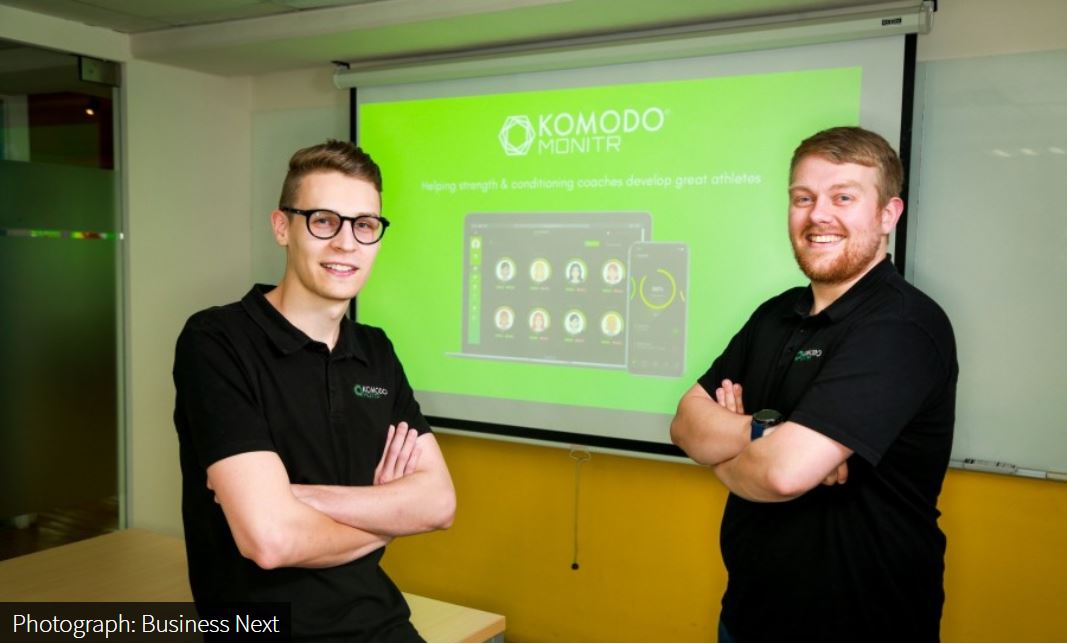Meet Komodo Monitr, New Zealand-based startup aiming to unlock greater athletic potential with data analytics

"Running a startup is like riding a roller coaster," said Jack Wood, co-founder & BD director of Komodo Monitr. “If you’re doing a startup, you’ve got to love what you do because no one is forcing you to do it.”
A few weeks earlier, the New Zealand based startup had just finished a two-month training program at Hype SPIN sports accelerator in Taipei, Taiwan. It culminated in a demo day, where they pitched to an illustrious group of investors and industry experts about their software platform for coaches to track the performance and physical conditions of their athletes.
We sat down for a conversation with the Komodo team, asking what motivates them to start the venture, what keeps them passionate about what they do, and what brings them to the island some thousand miles away from the Kiwi land.
Sitting next to Mr. Wood was co-founder & CEO Chris Bacon, who has four years of experience in Premier League in England and a PhD at sports science. The product that Komodo offers, in fact, is largely based upon his research project at the university.
“I wanted to do research that makes difference and can be used every single day,” he told us. By helping amateur athletes develop skills and avoid injury, the software will unlock greater athletic potential, as he explained Komodo’s vision on the demo day.
Taking research into the real world
“Over the past few years, there has been a 60% increase in youth sport injuries,” said Mr. Bacon. They mainly result from overtraining and poor well-being caused by malnutrition, dehydration, stress, and sleep deprivation.
Athletes suffering from bad physical and mental conditions cannot perform well as they can at most times. The situation only worsens when they try to do exercises they normally do.
Also, S&C (strength and conditioning) coaches often struggle to prepare the athletes under their supervision. In most cases, coaches ask them to fill out surveys in order to understand their body conditions and end up with massive amount of data that are difficult to process. This is where Komodo’s app comes in — to automate the coach’s job, so “they can go and coach instead of having to go through spreadsheets,” said Mr. Bacon.

The app automatically collects objective health data, including sleep time, heart rate, and walking distance, from the smartwatch that athletes wear. In the meantime, they’re tasked with inputting some data — about their diet, stress level, and so on — into the app on their own. Combining facts and opinion, the software is able to generate insights into how athletes can get the most out of training without hurting themselves.
Smartwatch isn’t a must have, Mr. Bacon added. But the more data the app collects, the better the advice it can possibly offer. The team is also looking to secure a manufacturing partner in Taiwan to provide the hardware for its customers.
He gave an example to explain the type of advice available: an athlete, who is able to squat 200 kilograms, may have difficulty doing so after a night of one-hour sleep. Instead of sticking to the same weight, the app would suggest that they do 150. “We adapt the program based on the response from athletes,” he concluded.
With the app, athletes are also allowed to report injuries and inform their coaches if they’ve done extra training sessions, which can lead to fatigue.
“Next big development we are doing is being able to develop a program for each athlete,” said Mr. Bacon. The app may suggest that an athlete do a certain number of pushups and pullups, once powered by artificial intelligence in the future.
Towards the number one choice for developing athletes worldwide
Positioning itself as a sports analytics software, Komodo helps coaches to supervise and develop amateur athletes with an easy-to-use dashboard. It’s now sold as a service to coaches of school teams and sports clubs on a B2B basis.
“We work with any sport, from football to rugby,” Mr. Bacon pointed out. It’s one of the major advantages that allow the startup to stand out from competitors.
Globally, the market value for such type of software stands at $5B and it’s growing, he said. “A lot of competitors in the space sit in elite sports.” It’s in fact only until recent years that entrants started to emerge in the amateur space, as the awareness towards data collection rises.
Mr. Bacon believes that data, once properly analyzed, can be a valuable asset. For instance, athletes may use them to build resume and apply for universities, and college scouts may use them to find the best players for their teams.

“We want to become the number one choice for developing athletes worldwide,” he said, by helping them monitor high-quality data. The startup expects to close its seed round of funding in February and expand into Australian market this year.
Given their plan to go global, they jumped at the opportunity when offered a place at the Taipei-based accelerator, Mr. Bacon told us. The resources and connections with major sports brands that they then would have access to are another pull.
Speaking of Taiwan, besides a manufacturing hub where they seeks to find a wearable maker to work with, he said it’s a test bed for East and Southeast Asian market. The two co-founders have considered offering their service to private schools in Taiwan such as Taipei American School.
Overall, their experience in Taiwan seems positive. “Everybody is keen to help you succeed here, ” said Mr. Wood.
〔Original :Meet Startup @ TW〕
https://meet.bnext.com.tw/intl/articles/view/46078